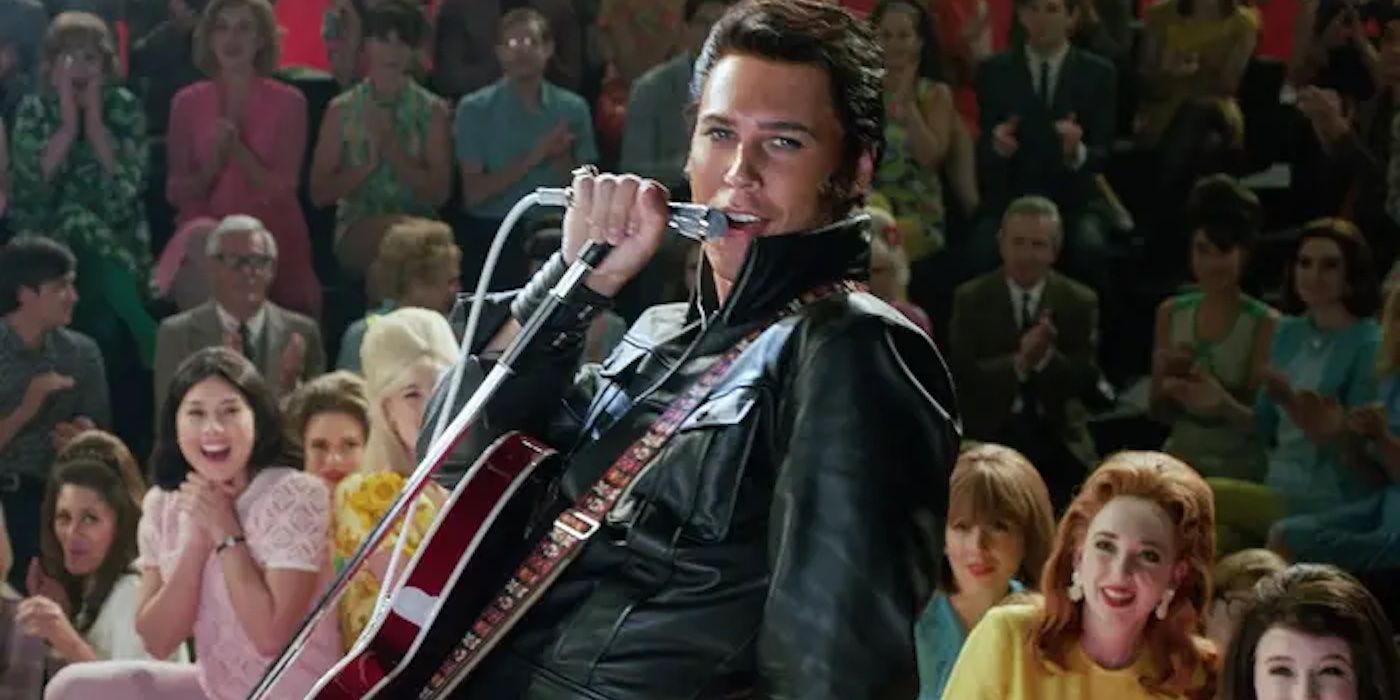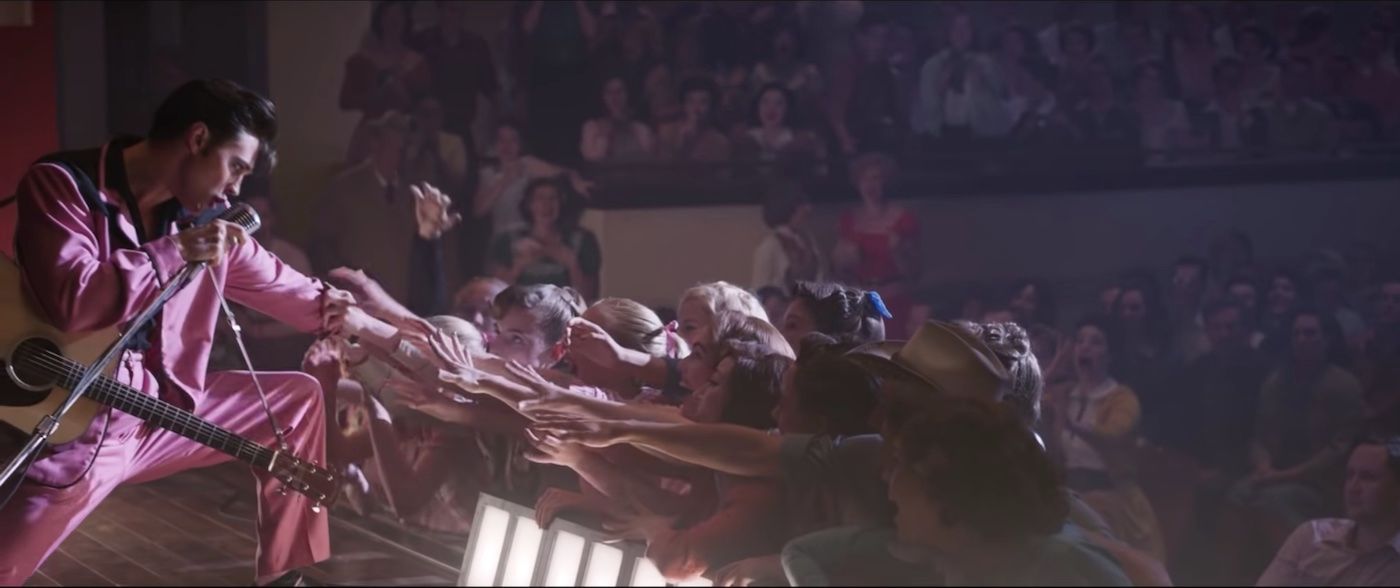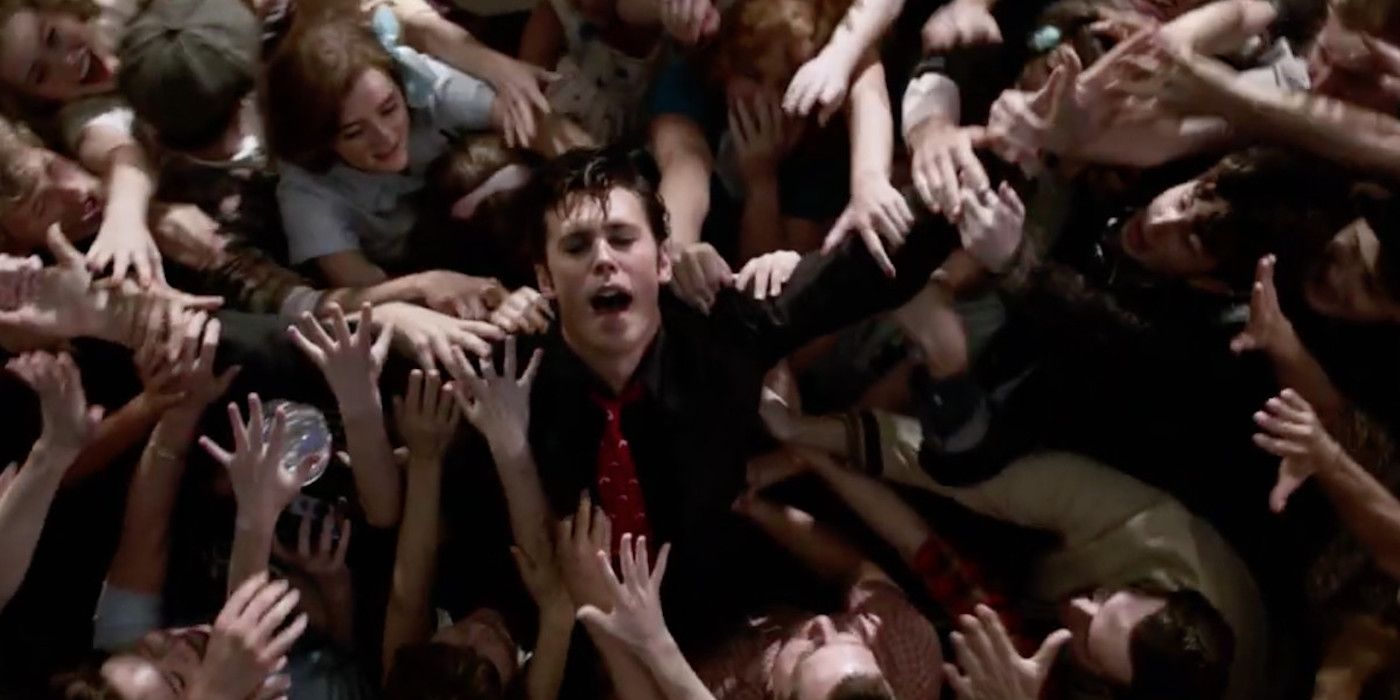Elvis Presley’s legacy is tied to hordes of screaming fans as much as his musical ability. Although he left the building for the final time forty-five years ago, Elvis maintains an iron grip on American culture. The recent success of the film Elvis proves that the love for the King isn’t going away anytime soon. The former would-be electrician, whose style was heavily influenced by Black musicians through his love of gospel and blues, was unlike anything the world had heard before when Sun Records released his first single in the summer of 1954. For the adults at the time, his swiveling hips and rockabilly guitar were everything that was wrong with the country. To teenagers, especially young women, he represented an opportunity to express their desire for something explicitly forbidden socially: sex. The conflicting morals of young and old come together in Baz Luhrmann’s Elvis, a spellbinding take on a biopic that asks how far we have come.
America in the 1950s was standing on the brink of history. The years following World War II were sleepy, with the country lavishing in the economic boom the next few decades would bring, but a knock at the door signaled that change was coming fast. Although women enjoyed some newfound freedoms thanks to the war effort, most notably in establishing them as part of the workforce, America still retained rather conservative views towards how women should express their sexuality. Women were expected to be homemakers and to obey their husbands; the idea of an ideal nuclear family and the 1950s housewife was firmly established during this time. Thanks to this, the decade generally conjures sanctified images of poodle skirts, malt shops, and drive-ins where life was simpler. However, history is not always as factual in our memories as it was in truth, and these rose-colored memories often leave out the sexual revolution that also occurred during this time.
For those who weren’t alive when Elvis rose to fame, it can be difficult to understand the impact a single person made on American history and culture. Elvis’ music and movements allowed young women to channel their frustrations about societal limitations. And yet, in Elvis, the sensation is perfectly captured in a way only a Baz Luhrman film can execute: a maximalist visual feast that makes the audience feel as though they were alongside them. A notable moment in the film occurs when Elvis (Austin Butler) performs "Baby Let’s Play House" at a Lousiana Hayride appearance. Although the scene is from the perspective of his manager, Tom Parker (Tom Hanks), Elvis’ impact on the young women in the crowd is captured in a way that makes it just as jarring as it was nearly seventy years ago. Luhrman’s camera work and cut shots enhance the frenzy felt in the room as women, young and old, are compelled to scream for the singer. The scene is not a reenactment of the event (which took place in 1954) but an almost dreamlike vision with exaggerated guitar riffs marking each scandalous twist of his hips that allows the audience to experience the heart-pounding sensation.
Although screaming for a musical act is commonplace today, there was an expectation in the 1950s for audience members to remain in their seats and politely clap to show appreciation. Elvis’ performances became synonymous with young women crowding the stage, hoping for a glimpse, a touch, or even a kiss from their idol. Even beyond his movements, Elvis’ long hair and flashy clothing transcended male expectations of the time. By pushing against societal gender norms, he encouraged the female audience to look inward, becoming the physical manifestation of their secret desires. Charles Gruenberg, who wrote extensively about Elvis for the New York Post in 1956, reported on how the crowd responded to the King: “A girl about 14 screamed as if she’d been suddenly scalded. A second teenager sitting next to her was making weird guttural whines. Another girl was scratching her arm with her fingernails, leaving long red welts. After the show, I heard one girl tell another, ‘I grabbed his hand and he grinned and said, ‘Cut me loose?’ So I cut him loose. It was heavenly. He’s the dreamiest thing I ever laid my eyes on.’” In the film, Tom Parker observes the inner conflict of a fan moved to the point of acting on emotional impulse, saying that “[Elvis] was a taste of forbidden fruit, she could have eaten him alive.”
The sexual reckoning Elvis started, albeit unintentionally, would follow him for the remainder of his life, as would the media’s outcry. In Elvis, in light of the pandemonium that constantly follows him, Elvis is warned before a performance in Florida that doing so much as “wiggling a finger” will get him arrested. He decides to push boundaries once again by performing "Trouble," a song that explicitly embodies defiance. His wiggling involves far more than a finger as he moves and thrusts across the stage, causing a similar hysteria as he did during his Lousiana Hayride performance. The scenes captured through the lens and flashbulbs of the press freeze these moments in time: women reaching for him, screaming as he holds their faces, desperate to be noticed.
The sound cuts out as the crowd overwhelms the stage and Elvis is dragged off by police, a metaphor for how out of hand the situation has become. Headlines spouting lines like “Crimes of Lust and Perversion” flash across the screen, mirroring the microphone feedback echoing in the background. Elvis is excellent at pulling this emotion from the audience, building them up alongside a performance only to cut it short and shame them for feeling enraptured.
Although the days of Elvis pandemonium are long gone, the spirit of the frenzy he evoked still lingers today. Luhrmann's film bridges this gap in a scene that welcomes Elvis to the city that would almost become synonymous with his legacy, Las Vegas. After his marriage to Priscilla (Olivia DeJonge), Elvis ushers in a new era of his life with a montage set to the song "Viva Las Vegas." Luhrmann’s choice to remix the familiar Vegas anthem with Britney Spears's "Toxic" draws obvious comparisons between the two artists. Both struggled under controlling management, performed in sold-out Vegas residencies, and faced the ire of the American public for being labeled sex symbols. While there were forty years between her and Elvis’ time in the limelight, the scrutiny Britney Spears faced shows that America has not yet come to terms with accepting sexuality in pop culture. While their actions will continue to sell (both Elvis and Britney are among the top-selling artists of all time), public figures will be shamed for the very thing that helps to line the pockets of those who profit off them.
While Elvis may not fully leave the audience with a deeper understanding of who the subject was beneath the bedazzled jumpsuit, it fully encapsulates the time that surrounded and pushed the King of Rock and Roll forward. Elvis’ music and his actions are as recognizable today as they were nearly seventy years ago. Although a 21st-century audience may not be as scandalized by Elvis the Pelvis as they once were, Elvis reminds us that American society is not as enlightened as we may think.




